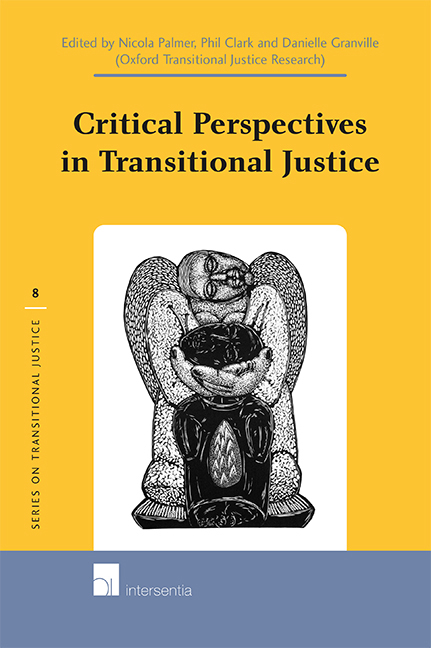Book contents
- Frontmatter
- Note
- Acknowledgements
- Contents
- Abbreviations
- Introduction
- Section 1 Critiquing Core Concepts in Transitional Justice
- Section 2 Accountability, Human Rights and the Rule of Law
- Section 3 Locality and Legitimacy
- Section 4 Memory, Ritual and Apology
- Section 5 Transitional Justice After Transition
- Contributors’ Biographies
- Series on Transitional Justice
3 - A Discourse Theoretic Approach to Transitional Justice Ideals: Conceptualising ‘Reconciliation’ as an Empty Universal in Times of Political Transition
Published online by Cambridge University Press: 22 December 2020
- Frontmatter
- Note
- Acknowledgements
- Contents
- Abbreviations
- Introduction
- Section 1 Critiquing Core Concepts in Transitional Justice
- Section 2 Accountability, Human Rights and the Rule of Law
- Section 3 Locality and Legitimacy
- Section 4 Memory, Ritual and Apology
- Section 5 Transitional Justice After Transition
- Contributors’ Biographies
- Series on Transitional Justice
Summary
INTRODUCTION
Scarcely anyone would deny that reconciliation is a desirable goal after violence and repression. It therefore may not seem surprising that reconciliation has emerged as a powerful ideal in the context of post-conflict situations. It has been promoted by incoming governments after civil war and regime transition, for example in Spain, Chile or South Africa and it has been the goal of several peacebuilding missions of the UN, for example in Sierra Leone or Timor Leste. In the academic discourse, reconciliation is predominantly discussed in relation to truth commissions. Truth commissions have become the dominant – though not exclusive – processes examined by scholars when theorising about reconciliation. In this context a powerful reconciliation paradigm has emerged which opposes reconciliation processes to retribution and punishment and largely takes for granted that truth-telling and finding out about the past lead to national reconciliation. This reconciliation paradigm is rather more normative than analytic, however. It recommends policies and processes in the name of reconciliation, but is ill-equipped to understand the performances of and differences between reconciliation mechanisms in transitional societies, other than by judging them as more or less complete or satisfactory. Reconciliation has, however, been central to a number of highly diverse transitional mechanisms: it served as a label for ‘forgive and forget’ policies in Spain or Namibia, it was the overarching goal of several truth commissions, and it was identified as an objective by punitive transitional justice institutions, for example the International Criminal Tribunal for the former Yugoslavia (ICTY).
In this chapter I suggest a way to theorise reconciliation and to inquire into the discursive role and the political effects of reconciliation policies. Based on a comparison of different reconciliation policies since the 1970s, I argue that reconciliation is first and foremost a discursive phenomenon which featured prominently in several transitional situations. I therefore suggest that a discourse theoretical approach can be fruitful for an analysis of reconciliation in transitional processes. Building centrally on the discourse theory of Ernesto Laclau and Chantal Mouffe, I argue that reconciliation can be conceptualised as an empty universal, a vague yet powerful social ideal which is fundamentally political as it produces social reality and legitimises or delegitimises certain policies.
- Type
- Chapter
- Information
- Critical Perspectives in Transitional Justice , pp. 51 - 72Publisher: IntersentiaPrint publication year: 2012
- 7
- Cited by



